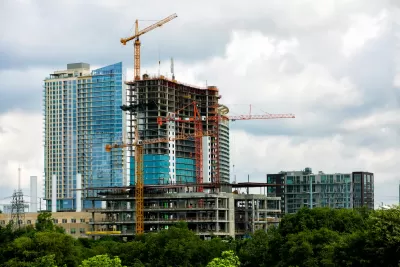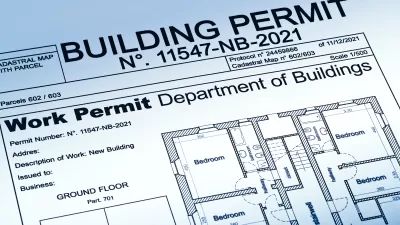A century-old law calls for a three-fourths vote to approve new projects when neighbors oppose the project, blocking affordable housing and multifamily developments.

A Texas state law requires a supermajority (three-fourths) vote in city councils to approve zoning amendments “when property owners of more than 20% of the adjacent property are opposed to the change in zoning” regardless of how many property owners are adjacent to the property in question, effectively killing many housing developments, according to reporting by Iris Dimmick in the San Antonio Report.
Under the current law, “The voices of current property owners have higher priority under the valid petition law than the potential tenants or beneficiaries of affordable housing.” San Antonio Mayor Ron Nirenberg supports eliminating the supermajority rule, noting that “Placing a supermajority threshold for the purposes of giving some members of the community an outsized voice to exclude people is, in my view, anti-democratic.”
Zoning amendments are the only type of change that requires a 75 percent supermajority, Dimmick adds. “Examples across the state show that the valid petition law has interfered with several affordable housing projects, from a single garage apartment, to multifamily projects like Vista Park and acres of single-family homes.”
The ‘valid petition’ law can be traced back to a 1920s New York City zoning ordinance that became part of the federal Standard State Zoning Enabling Act, which stemmed from the desire of Fifth Avenue merchants to exclude Jewish businesspeople from opening shop near them. Today, at least 20 states have a valid petition process on the books.
According to researcher Salim Furth, the law has a chilling effect on new multifamily development, even when it is not officially used to block a project. For housing activists, reforming the law would clear up a bottleneck for new housing development and prevent a small number of property owners from blocking new affordable housing.
FULL STORY: How a 100-year-old, ‘anti-democratic’ law is killing Texas housing projects

Planetizen Federal Action Tracker
A weekly monitor of how Trump’s orders and actions are impacting planners and planning in America.

Map: Where Senate Republicans Want to Sell Your Public Lands
For public land advocates, the Senate Republicans’ proposal to sell millions of acres of public land in the West is “the biggest fight of their careers.”

Restaurant Patios Were a Pandemic Win — Why Were They so Hard to Keep?
Social distancing requirements and changes in travel patterns prompted cities to pilot new uses for street and sidewalk space. Then it got complicated.

Platform Pilsner: Vancouver Transit Agency Releases... a Beer?
TransLink will receive a portion of every sale of the four-pack.

Toronto Weighs Cheaper Transit, Parking Hikes for Major Events
Special event rates would take effect during large festivals, sports games and concerts to ‘discourage driving, manage congestion and free up space for transit.”

Berlin to Consider Car-Free Zone Larger Than Manhattan
The area bound by the 22-mile Ringbahn would still allow 12 uses of a private automobile per year per person, and several other exemptions.
Urban Design for Planners 1: Software Tools
This six-course series explores essential urban design concepts using open source software and equips planners with the tools they need to participate fully in the urban design process.
Planning for Universal Design
Learn the tools for implementing Universal Design in planning regulations.
Heyer Gruel & Associates PA
JM Goldson LLC
Custer County Colorado
City of Camden Redevelopment Agency
City of Astoria
Transportation Research & Education Center (TREC) at Portland State University
Camden Redevelopment Agency
City of Claremont
Municipality of Princeton (NJ)





























